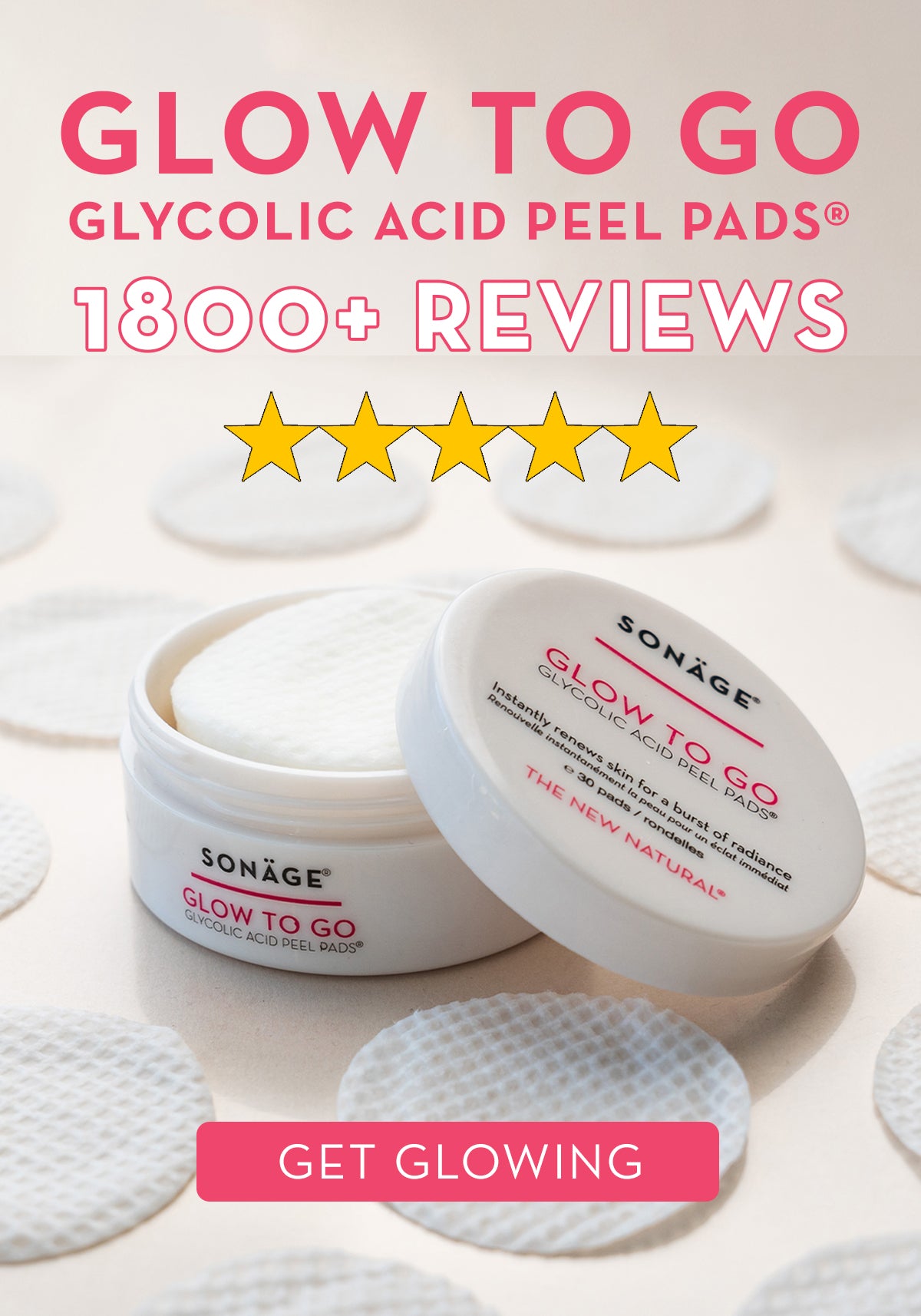AT A GLANCE
-
WHAT IT IS
Both chemical and enzyme peels exfoliate in their own unique ways. -
WHAT IT DOES
Chemical peels use AHAs and BHAs to help exfoliate dead skin cells away. These are often offered at med spas as treatments. Enzymes are derived from fruit to quickly dissolve dead skin away, a potent yet non-abrasive way to reveal fresher, more youthful skin. -
HOLY GRAIL PRODUCTS
Glow To Go Glycolic Acid Peel Pads, Gommage Exfoliating Gel, Pom Crush Detox Enzyme Mask
Enzyme Peel vs Chemical Peel: Which Is Better For Your Skincare Routine?
Hormones, pollution, weather, stress… So many factors can wreak havoc on our skin, even with the most perfect skin care routine. Just like other life responsibilities, our skin requires thoughtful maintenance. When your skin is feeling dull or on the verge of breaking out, you know it’s time to exfoliate. There are a number of ways to do this, but the most common treatments are enzymes and chemical peel. Both methods are non-invasive and exfoliate deeply to reveal brighter and younger-looking skin but the big question is - enzyme peel vs chemical peel - which is right for your skin?

Enzyme Peel vs Chemical Peel - The Difference
CHEMICAL PEELS include alpha hydroxy acids (AHAs) and beta hydroxy acids (BHAs). AHAs include Glycolic, Lactic, Malic, Tartaric, Mandelic and Azelaic. AHAs work by dissolving the inter-cellular lipids and proteins that hold dead skin cells to each other. The common BHA is Salicylic Acid. Salicylic is known for its lipid-soluble properties, making it a great option for oily and acne-prone skin. Glycolic acid in lower strengths tends to be the most popular at-home exfoliation treatment, which is significantly less concentrated than the pricey chemical peels that are offered at medical spas under the care of a licensed professional.
ENZYMES are naturally derived active ingredients found in many fruits. Pomegranate, Pumpkin, Papaya, Pineapple and Figs are just some of the fastest acting to dissolve dead skin to reveal smoother, softer and healthier skin. They are known to break up dead skin cells on the surface of the skin. Enzymes are potent but are a non-abrasive exfoliant option for all skin types. Enzymes work optimally at body temperature - do NOT use it under steam!
(As a precaution, both enzymes and chemical peels should be avoided by users of Retinol products or anyone with very sensitive or irritated skin.)
Enzyme peel benefits
An enzyme mask usually offers multiple benefits to your skin. These include clean and gentle exfoliation, cleansing & clearing of pores, and hydrating & brightening of skin. Regular usage of enzyme peel also helps in product absorption. If you're looking for a gentle, effective way to enhance the overall health of your skin and smoothen its appearance, enzyme masks are worth considering. As the enzyme peels breaks up dead skin cells on the surface of the skin and is non-abrasive, you will not be facing any purging or skin irritation.
Chemical Peel: Glow to Go Glycolic Acid Peel Pads for $30
YOU MAY PREFER CHEMICAL PEEL IF…
-
YOU ARE PATIENT WITH YOUR SKINCARE RESULTS
Long-term effectiveness is likely one of the most important considerations when picking an at-home chemical peel. In the battle of enzyme peel vs chemical peel, Glycolic acid is always the winner. This is because Glycolic is the multi-tasker of the exfoliating world: it encourages new skin cells to grow and smooths the skin by penetrating to deeper layers than enzymes can. While an enzyme peel may soften the skin and show immediate results, glycolic acid takes these results a step further by softening the skin and also brightening it.
-
YOU SEEK PROGRESSIVE ADJUSTABILITY
Glycolic acid can be adjusted to increase the level of exfoliation a person achieves over time. It is recommended you start at a lower grade, for example, 2-4% strength, and graduate to a higher strength for better results. Enzymes do not have this adjustability. As a result, you may not notice true improvements in your skin over time.
-
YOU PREFER PRODUCTS WITH A STABLE SHELF LIFE
Enzymes can be temperamental to control when added to skincare routines. They must be stored in an optimal manner: no moisture, heat, or pH changes. Otherwise, the enzymes start to inactivate and become ineffective at exfoliating. Home-use chemical peel, however, have a longer shelf life and are more durable.
Enzyme Mask: Pom Crush Detox Enzyme Mask for $48
YOU MAY PREFER ENZYMES IF…
-
YOUR SKIN IS EASILY IRRITATED
Both enzyme peel and chemical peel work to exfoliate dead cells, however chemicals can also damage and remove live tissue. The active ingredients in enzymes only leave a gentle tingling since they don't remove significant layers of the skin. As a result enzymes are far gentler on the skin than their chemical counterparts, but in no way less mighty or effective. Since they are safe and non-invasive, an enzyme peel can be used at home to refresh skin and prepare it for proper hydration. As they are so gentle, enzyme peels are most recommended for easily irritated and sensitive skin types. However, they combat a number of other major skin concerns, such as anti-aging, congested skin and enlarged pores. Enzymes can be used for wrinkles and natural acne scars.
-
YOU ARE PREGNANT OR BREASTFEEDING
Pregnant or breastfeeding women must not use a chemical peel as the ingredients can absorb into your skin and potentially cause damage to your baby. In contrast, enzymes do not have contraindications or side effects. However, before using any type of exfoliation, you should always consult with a physician or medical professional and have your skin evaluated by a skin expert.
-
YOU HAVE A COMPROMISED IMMUNE SYSTEM
Cancer survivors or anyone with compromised immunity have to be very wary about what they put on their skin and it is recommended that they do not use a chemical peel. Natural enzyme skincare products derived from fruits do not contain aggressive ingredients. But always check with your physician first.
Enzyme Peel: Gommage Exfoliating Gel for $36
MORE ABOUT ENZYME PEEL
Enzyme Peel Treatment
As mentioned earlier, enzyme peels are much more gentler than a chemical peel. If your skin is sensitive, we recommend using the enzyme peeling gel for an at-home facial treatment. As opposed to chemical peels, enzyme peel benefits your complexion using a simple and gentle method of exfoliation.
Enzyme Peel Facial
Everybody enjoys pampering themselves in the comfort of their own homes. An at-home enzyme peel is the perfect way to treat yourself to a facial. Enzyme peels are also a safer option for those that feel conflicted on how to exfoliate their skin.
Enzyme Peel for Acne
Enzyme facial peels are great for all skin types. It exfoliates and eliminates dead skin cells to reveal a healthy glow. Enzyme peeling gel is also highly recommended for acne-prone skin types as it sloughs off the surface dead skin. This will allow your serums, treatments, and moisturizers to penetrate deeper beneath the surface skin layer.
Best Enzyme Peel for Sensitive Skin
Enzyme exfoliating peel is gentle enough for even the most sensitive skin. It is a great exfoliating method with nothing but wonderful fruit ingredients to benefit your skin. Our professionals recommend the Gommage Exfoliating Gel for all skin types.
Best Ingredients for Enzyme Peels
As mentioned earlier, Pomegranate, Pumpkin, Papaya, Pineapple, and Figs are a few of the best fruit enzymes. However, one of the key ingredients to spotlight is the pumpkin enzyme peel. This fruit enzyme is rich in vitamins and minerals to not only exfoliate the skin but to help your skin prevent and stay clear of blemishes. Pumpkin enzyme also has a smaller molecular structure than most other fruit enzymes, which makes it easier to penetrate deeply into the skin surface.
Some pumpkin enzyme peel benefits include destroying free radicals which helps prevent premature aging. It also contains Vitamin A and C that help stimulate collagen production, keeping your skin soft, plump, and youthful. In conclusion, pumpkin enzyme peel detoxifies and rebuilds your skin by speeding up cell regeneration, leaving your skin smooth and radiant.
(As a precaution, both enzyme peel and chemical peel should be avoided by users of Retinol products or anyone with very sensitive or irritated skin.)
ENZYMES JUST SMELL SO DAMN GOOD
Well, Pom Crush Detox Enzyme Mask certainly does. The luxuriously curated natural enzyme mask is packed with the best fruit ingredients. It uses six natural potent fruit enzymes extracted from Pomegranates, Figs, Pumpkins, Papayas, Pineapple, and Astaxanthin. They work harmoniously together to gently exfoliate and reveal bright, radiant skin. And as a bonus, it has the aroma of an exotic beach with an infused tropical fruit air. We can't get enough!
How often should the most gentle enzyme peels be repeated?
If you have a normal skin type, then you can use the enzyme peels once a week, but if you have oily or combination skin type, you can also use the peels twice a week. Depending on your need you can work this out between twice a week to once in two weeks. One important aspect to remember is that if you are using retinoids, then it is better to not combine them with either of the peels. It is always advisable to skip using retinoids on the days you use peels.
When would an enzyme peel not be typically used?
While enzyme peels are used by many with sensitive skin, if you are someone who is looking for products with stable and longer shelf life, then you might have to skip enzyme peels and use chemical peels like “glow to go” glycolic acid peel pads. Additionally, enzyme peels cannot be adjusted according to your progressing needs. In such cases, chemical peels come more handy & practical.
Are enzyme peels safe during pregnancy?
If you are pregnant or a breastfeeding mother, then it is advisable to avoid using chemical peels during pregnancy. However, you can use enzyme peels. Enzymes do not have contraindications or side effects. However, before using any type of exfoliation, you should always consult with a physician or medical professional and have your skin evaluated by a skin expert. One important thing to note is that if you are on any other medical treatment, it is always advisable to check first with your doctor or primary physician before starting any new skincare regime.
CONCLUSION: ENZYME PEEL VS CHEMICAL PEEL
If you are patient enough for long-term, effective results, go with an at-home chemical peel like Glow To Go Glycolic Acid Peel Pads. If you have sensitive skin or prefer a gentle exfoliant with quick results, a great enzyme peel (or scrub) is our Gommage Exfoliating Gel or if you prefer a mask option, the Pom Crush Detox Enzyme Mask. This holy grail is an amazing enzyme product recommended by Estheticians and Professionals. Listen to your skin and find your balance!
REMEMBER...
Exfoliating improves skin turnover, which is beneficial for skin renewal and keeps it radiant and fresh. It encourages the removal of dead skin cells – unclogging congested pores and preventing blackhead formation.
We recommend exfoliating 1-2 times a week, but no more than that! Over-exfoliating pulls cells away that are not ready to shed, which will leave your skin red, tender, and sensitive. In contrast, insufficiency will leave your complexion looking rough and dull which weakens serum and moisturizer application as they will not absorb properly. And remember - sunscreen is VITAL, especially if you are a serial exfoliator.
Read More:







